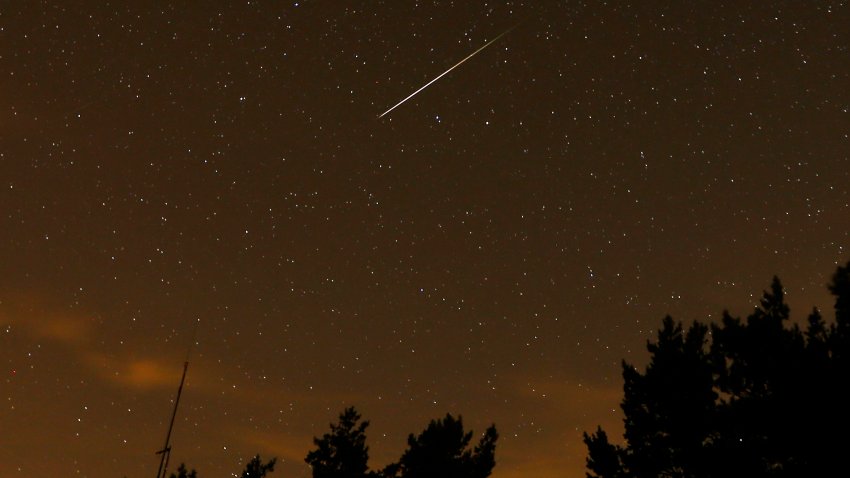-

What time is the last supermoon of the year? Best times to look up
The final supermoon of 2024– and the last we’ll see for nearly a year — will rise this week, but when should you look up?
-

When to catch the last supermoon of the year, and why its special
Better catch this week’s supermoon — it will be a while until the next one.
-

November supermoon will rise this week, and here's why it's so special
This week’s full moon will also be a supermoon, the final one of 2024 and the last one we’ll see for quite some time.
-

Last supermoon of 2024 is in November: When to catch it
Astronomers say better catch this week’s supermoon. It will be a while until the next one.
-

October's supermoon pairs with a once-in-a-lifetime comet for rare nighttime spectacle
The Tsuchinshan-Atlas comet is still in the neighborhood and will wow stargazers in the North Hemisphere after making an appearance in the Southern Hemisphere over the weekend.
-

A rare comet will brighten the night skies in October
A rare, bright comet will be visible in October, clear skies permitting. The comet will make its closest approach to Earth on Saturday.
-

Earth's new mini moon discovered, but it won't be around for long
Earth has temporarily gained a second moon, dubbed 2024 PT5, which was discovered last month by researchers during routine monitoring.
-

Earth will have a temporary ‘mini moon' for two months
Earth will have a temporary “mini moon” for two months. The mini moon is actually an asteroid about the size of a school bus.
-

Full Harvest Moon, partial lunar eclipse visible Tuesday
A full Harvest Moon and partial lunar eclipse were visible Tuesday, with Chicago-area residents taking in the unique sight. NBC Chicago’s Natalie Martinez reports.
-

What time is the partial lunar eclipse Tuesday? What to know about this Harvest Moon
What time is the super harvest moon partial lunar eclipse Tuesday night?
-

Look up! Don't miss your chance to see the Super Harvest Moon Partial Lunar Eclipse
Look up! September’s full moon is here, and this year, it’s unique not one but two reasons.
-

Catch a partial lunar eclipse during September's supermoon
Get ready for a partial lunar eclipse and supermoon. The spectacle will be visible in clear skies across North and South America Tuesday night and in Africa and Europe Wednesday morning. A partial lunar eclipse happens when the Earth passes between the sun and moon, casting a shadow that darkens a sliver of the moon. Since the moon will inch...
-

Next week's full moon will be particularly special. What to know about the Harvest Moon
The next full moon is coming up, but this one will be particularly special.
-

Partial lunar eclipse set to occur next week
Mark your calendars for Tuesday, September 17, as a partial lunar eclipse will begin at 7:41 p.m. Our meteorologist Kevin Jeanes gives us the details.
-

Here's how to watch a quartet of supermoons this year
The first of four supermoons this year rises next week and stargazers could catch a moon that can be 30% brighter than average.
-

August's supermoon kicks off four months of lunar spectacles. Here's how to watch
The first of four supermoons this year is about to rise. Stargazers can catch the first act Monday as the full moon inches a little closer than usual, making it appear slightly bigger and brighter in the night sky.
-

Mars and Jupiter get chummy in the night sky. The planets won't get this close again until 2033
Mars and Jupiter are cozying up in the night sky for their closest rendezvous this decade.
-

This ‘secret' Wisconsin spot could be one of the best places in the US to catch Perseids meteor shower
The best chance to see the Perseids meteor shower is to view it under a dark sky – and this ‘secret’ park in Wisconsin could be your best bet.
-

The Perseids are here. Here's how to see the ‘fireballs' of summer's brightest meteor shower
The Perseid meteor shower reaches its peak early Monday. Astronomers say it’s one of the brightest and most easily visible showers of the year.
-

Rare double meteor shower event to peak on Tuesday
The Southern Delta Aquariid and the Alpha Capricornid meteor showers will both reach their peak on Tuesday. Here’s what you need to know about the shooting star event.

